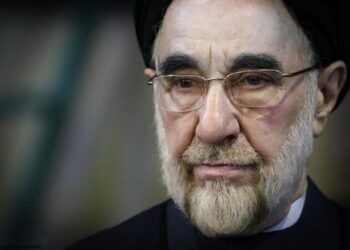has come under much criticism in the Arab world for suggesting a few weeks ago that Iran should be invited to join security discussions with the Arab League.
Many critics complained that Musa was simply helping Iran to do what Arabs constantly complain of—interfere in Arab affairs.
But Musa last week said it was in the Arab world’s self-interest to meet with Iran and discuss security issues.
He said the Big Six powers—China, Russia, Germany, France, Britain and the United States—may soon sit down with Iran and discuss Middle Eastern security issues while the Arabs are shut out
Musa was interviewed at length last week by Dubai-based Al-Arabiyya satellite television.
The interviewer said that it is not only the Persian Gulf Arab states that feel Iran poses a threat, but all the Arab League’s member states feel that Iran interferes in one form or another in their affairs and were surprised by Musa’s suggestion for talks, asking how could he contemplate involving Iran in Arab affairs.
Musa replied that in recent years the League has pursued new methods to expand its activities and explain Arab causes to the world. He said the League has begun to establish forums with states such as China, Japan, India, Turkey and Russia, and those forums succeeded and initiated “wide collective Arab diplomatic activity.”
Musa said the League also held an Afro-Arab summit, and there are now discussions on holding an Arab-European summit, and it was on that premise that he built his proposal on neighboring states.
When he made his proposal, he said Israel is excluded because it occupies Arab territory, and the inclusion of Iran is deferred “because it is occupying UAE islands and because of its stands that are worrying many Arab states such as its nuclear program.”
Then he said, “I do not understand how states that are 5,000 miles away [presumably a reference to the United States] are prepared to try and save a situation and propose plans, while we, the immediate neighbors, do not do that. Any military nuclear program in the region—be it Israeli or non-Israeli—can threaten our security.”
Musa said: “There have been allegations—a general feeling, and perhaps there are signs of it—that Iran’s policy is disturbing the Arab World, or parts of it. That is a subject we need to discuss. There is also the nuclear subject. The third subject is the regional situation. Is it possible that Europe or the Big Six propose to Iran to discuss regional security—with one state, one state only—while we do not participate in such a discussion?”
Musa said he protested about that to Iran and the six states and told them: “That is a matter that concerns us all and we the Arab states—the majority of the region’s states—are the side that is primarily concerned with regional security.”
Musa emphasized the need for the Arab League to have a dialogue with Iran. He said the reports that “Musa has included Iran in the Arab League are untrue, nor is it true that Turkey has been brought into the Arab League, or France.”
He said all those neighboring states, with the exception of Israel, should be invited for discussions at the Arab League, while “the subject of Iran should be deferred. We should rely on dialogue between us and this Middle Eastern state,” he said somewhat confusingly.














